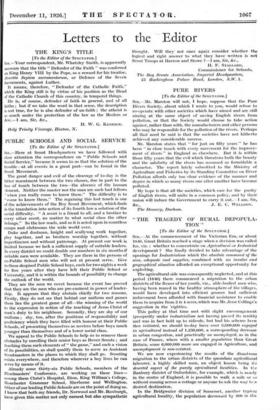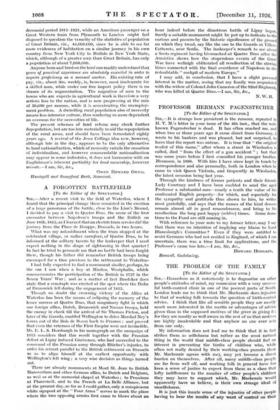"THE TRAGEDY OF RURAL DEPOPULA• TION"
[To the Editor of the SPECTATOR.] SIR,—At the commencement of the Victorian Era, or about 1840, Great Britain reached a stage when a decision was called for, viz. : whether to concentrate on Agricultural or Industrial development ? She finally decided to take advantage of the openings for Industrialism which the absolute command of the seas, adequate coal supplies, combined with an insular and geographical situation afforded an exceptional opportunity for exploiting.
The agricultural side was consequently neglected, and at this period (1840) there commenced a migration to the urban districts of the flower of her youth, viz., able-bodied men who, having been reared in the healthy atmosphere of the villages, would have developed into efficient yeomen had sufficient inducement been afforded with financial assistance to enable them to acquire from 3 to 4 acres, which was Mr. Jesse Collings's suggestion in the 'eighties.
This policy at that time met with slight encouragement (prosperity under industrialism not having passed its zenith) and was in fact held up to ridicule, but had his scheme been then initiated, we should to-day have over 3,000,000 engaged in agricultural instead of 1,250,000, a corresponding decrease in urban congestion, and practically no unemployed, as in the ease of France, where with a smaller population than Great Britain, some 6,000,000 more are engaged in Agriculture, and unemployment is non-existent.
We are now experiencing the results of the disastrous migration to the urban districts of the quondam agricultural labourer, a highly skilled man, an object lesson being tie deserted aspect of the purely agricultural localities. In the Banbury district of Oxfordshire, for example, which is nearly in the centre of England, it is possible to walk a mile or so without corning across a cottage or anyone to ask the way to a desired destination.
In the Bridgwater division of Somerset, another typical agricultural locality, the population decreased by 800 in the decennial period 1911-1921, while an American passenger on a Great Western train from Plymouth to London might feel disposed to question the veracity of the statistics of population of Great Britain, viz., 44,000,000, since he is able to see far more evidences of habitation on a similar journey in his own country from New York City to Buffalo in New York State, which, although of a greater area than. Great Britain, has only a population of about 7,000,000.
Anyone born and bred on the land can readily understand that years of practical experience are absolutely essential in order to acquire. proficiency as a manual worker. His existing rate of pay, viz., about 30s. weekly, is, however, most inadequate for a skilled man, while under our free import policy there is no chance of its augmentation. The migration of men to the towns who are experts in agricultural work is therefore a very serious loss to the nation, and is now progressing at the rate of 50,000 per annum, while it is accentuating the unemploy- ment problem. A dwindling rural population also of necessity means less intensive culture, thus rendering us more dependent on overseas for the necessities of life.
The present schemes of land reform may check further depopulation, but are too late materially to aid the repopulation of the rural areas, and should have been formulated eighty years ago. A revival of the Jesse Collings idea now, however, although late in the day, appears to he the only alternative to land nationalization, which of necessity entails the cessation of individualism, and however commendable nationalization may appear in some industries, it does not harmonize with an Englishman's inherent partiality for land ownership, however minute.—I am, Sir, &c.,
OWEN HOWARD OWEN.
Ilunt.spill and Sampford Brett, Somerset.















































 Previous page
Previous page